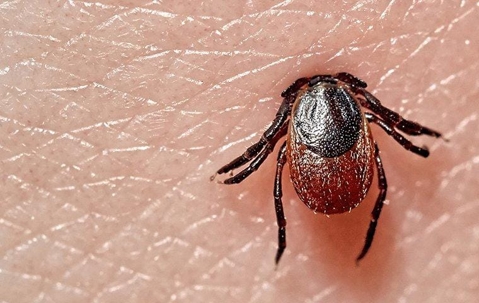Tick-borne diseases are a growing concern for travellers worldwide, with tickborne encephalitis emerging as a significant health risk in certain regions. As adventurers venture into nature-rich destinations, understanding TBE becomes crucial for safeguarding health and well-being.
Approximately 10,000 – 12,000 clinical cases of tickborne encephalitis are confirmed yearly worldwide. Still, this figure is considered to be significantly lower than the actual total number of cases due to the mild or symptomatic nature of the majority of cases.

Tickborne encephalitis is a viral infection primarily transmitted through the bite of infected ticks. These ticks carry the TBE virus and can pass it on to humans during feeding. The impact of TBE on the central nervous system underscores its significant threat to human health.
The virus can also be spread by consuming unpasteurised milk and dairy products. Although it is not spread from person to person, there have been rare reports of transmission through blood transfusions and from mother to baby during breastfeeding.
Tickborne encephalitis is prevalent in Europe and Asia, where tick populations thrive in their natural habitats. Notable incidences of TBE have been reported in countries like Austria, Germany, Switzerland, and the Baltic states. It’s important to note that tick activity peaks during the warmer months making TBE a seasonal infection, with cases usually reported from April to November.
During the past 30 years, the range of Tickborne encephalitis virus transmission appears to have expanded to new geographical areas and to higher altitudes. Climate change is thought to have resulted in this shift of TBE risk areas, diagnostic/surveillance, and changes in human activities.
Ticks that carry TBE can be found in forest fringes, gardens, grasslands, woodlands, and city parks.
In 2019, the first TBE virus detection in UK ticks was reported from Thetford Forest, East Anglia, England. In the same year, TBE was confirmed in a different geographical location in England: the Hampshire/Dorset border.
In September 2022, a TBE case was reported in England and likely acquired in Scotland in June 2022. In October of the same year, another case was reported, likely due to exposure in the North Yorkshire Moors.
The current assessment of overall TBE risk in the UK is very low for the general population.
The symptoms of TBE can range from mild to severe, with flu-like symptoms often marking the initial stage of infection. Most infections can have no symptoms.
Individuals may experience neurological complications as the virus progresses, including encephalitis (inflammation of the brain) and meningitis (inflammation of the membranes surrounding the brain and spinal cord). These severe symptoms occur approximately 7 days after the flu-like symptoms. Severe cases of Tickborne Encephalitis can result in long-term neurological damage or, in some instances, prove fatal. TBE is rarely fatal in Europe; however, in Asia, the fatality rate is 20% of cases, with long-term neurological problems common.
Your risk is dependent on the following factors for your trip:
By booking a video consultation with our Travel Health Nurse Specialist, you will receive a personalised risk assessment and any vaccine recommendations for your trip.
Preventing Tick bites is paramount in reducing the risk of Tickborne Encephalitis by
There is a vaccine for anyone living in an endemic area. Some countries a vaccination program against TBE.
For UK travellers the vaccine is recommended for:
The vaccine consists of 3 vaccines over the course of 5 months. For more information, book here to speak to our Nurse specialist.
In conclusion, Tickborne Encephalitis (TBE) presents a significant health risk for travellers exploring Europe and Asia. While the overall risk in the UK remains low, recent cases highlight the importance of awareness and proactive measures. Understanding the symptoms, risk areas, and preventive measures is essential for travellers to reduce their risk of TBE.
Knowledge and preparation are the keys to minimising the threat of TBE and ensuring a memorable and safe travel experience amidst nature’s beauty.
Resources:
NaTHNaC – Tick-borne encephalitis (travelhealthpro.org.uk)
Written by Amanda Howarth May 2024
Are you planning an exciting adventure abroad? Whether you’re embarking on a tropical vacation, a backpacking trip through Asia, or a Safari in Africa, ensuring you are up to date with your travel vaccinations is crucial for a safe and healthy journey.
This guide will address some common questions regarding travel vaccinations, including where to get them, which ones are free on the NHS, how to obtain them, and the ideal timeframe to schedule your vaccinations before your trip.
Cholera is a serious illness caused by a bacteria known as Vibrio cholerae. It is particularly risky in areas with poor water treatment, sanitation, and hygiene practices.
Even though cholera is not common in the UK, it can pose significant risks to travellers visiting affected regions. This article delves into the nature of cholera, the dangers it presents to UK travellers, and the measures that can be taken to prevent it.
The Zika virus is a disease transmitted by mosquitoes that has received a lot of media attention in recent years due to its severe health implications, especially for pregnant women. It’s important to be aware of the risks and take steps to prevent it in order to have a safe and healthy experience
Embarking on a gap year adventure is an exciting milestone. Exploring new cultures, meeting people from different backgrounds, and experiencing the world beyond your comfort zone is invaluable. However, it’s crucial to prioritise your health while travelling. Here’s a comprehensive guide to ensure you stay healthy and make the most of your gap year journey.